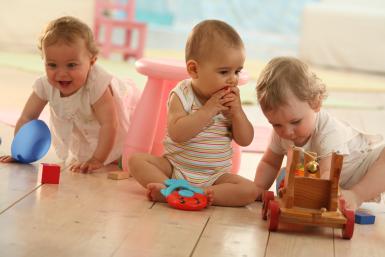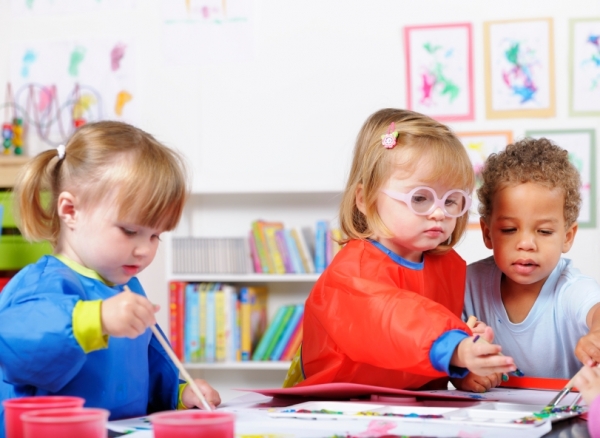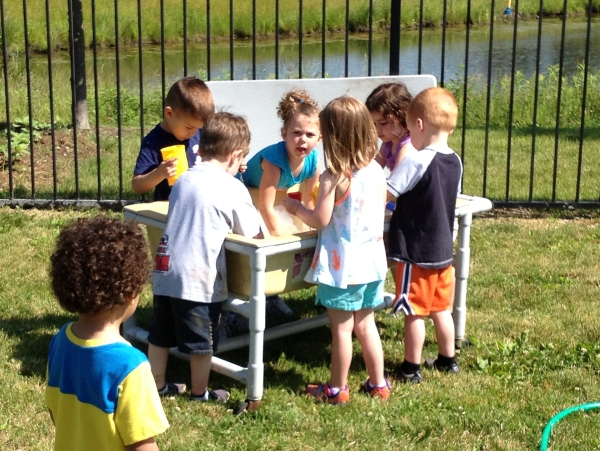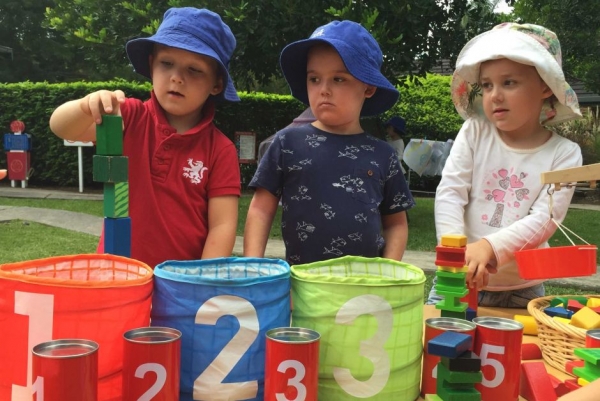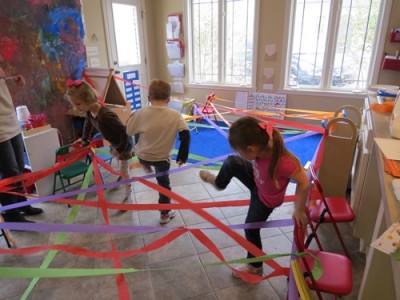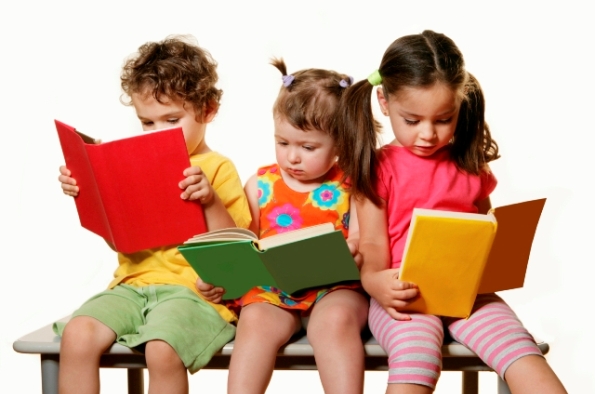Our Rooms have been set up loosely based upon the children's ages. Progression or movement from room to room is based upon the individual child and their level of readiness to move to a new room. When a child is ready, our Educators will discuss this with you and develop a transition plan to ensure that movement from one room (and a familiar group of children and Educators) to a new room (of different children and Educators) takes place at the child's pace, minimises disruption and supports the child's sense of security.
Nursery Group Rooms - Babies and Toddlers (0-24 months)
Babies
Babies (around 6 weeks to usually around 15 months). In this space, we follow your home routines as much as we possibly can. We provide a separate sleep space for the babies and provide cots. Sensory play is very important for these wee people, but almost anything that the older children experience, our littlies do too. They are provided with outside play opportunities, they have art experiences, we read to them and sing songs. All these strategies provide social, cognitive and language development opportunities. The speed of development for our babies is astounding!
The level and type of communication between the Educators and their families is comprehensive and detailed; we have individual communication diaries for each child, specifying what has happened for your child throughout the day. From nappy changes, to sleep times, through to what was eaten, when and how much. The Educator team is familiar with the specialised needs of babies and love to care for and nurture them. The ratio in this group is 1 Educator to every 4 children (or 1:4).
Toddlers
Toddlers (around 15 months to 24 months/2years old). As the children's level of independence and confidence with walking and communication increases, so too does the type and range of support, stimulation and development opportunities that a child needs. Again, outdoor and active play needs are catered for along with greater opportunity for the children to express choice, to learn routine, to engage in co-play and collaborative play opportunities (depending on the individual child) and artistic expression. This is another huge development leap, with children sometimes learning to toilet train, share and talk.
The communication between the Educators and famlies is still comprehensive; we have individual communication diaries for each child, specifying sleep and rest times, what has been eaten and how much - as well as any special occurrences for your child during the course of their day with us. The Educator team is familiar with the developmental needs of this age group - when to minimise stimulation, when to offer more options etc - and they are chosen for their love of this particular age group. The ratio for the group is 1 Educator to every 4 children (or 1:4).
Senior Toddlers Room/s (Ages 24 months/2 years old - 36 months/3 years old)
Senior Toddlers
Senior Toddlers are becoming increasingly independent and are seeking to challenge their bodies and minds. In this space it is critical to provide ongoing challenges to further encourage the children to develop their sense of agency (ability to make choices) as well as better understand their own abilities. We offer a large range of opportunities for the children to further develop their collaborative and imaginative play, their physical capabilities (gross and fine motor skills) and furhter build their social skills. At this time, their verbal communication capabilities are building and they will be encouraged in finding their 'passions' , learning and growing.
Communication between our Educators and Families alters slightly to become more focussed on developing a strongly collaborative approach to building a space for your child to be successful. We'll fill you in on routines - how much they ate, drank and slept - and we'll talk more about how they operate in their peer group, what interests them at home/daycare, how we can build on skills and knoweldge etc. Again, children at this age are building so many skills and capabilities we love to see them learn and grow and our team loves working in this age group. The ratio for the group is 1 Educator to every 5 children (or 1:5).
Pre-School Rooms (Ages 36 months/3 years old - pre-school age (usually around 5 years old)
Pre-Kindy
Pre-Kindy is usually for our 3 to 4 year old children. At this age, our children will become more familiar with routine, begin to understand consequences and very much directly influence their learning environment. These children are usually very confident in their physical capabilities and are building a strong knowledge of what interests them - they really are starting to know what they enjoy doing and what they don't enjoy doing. All their senses are developing further and their sense of self is heightened almost daily! In this environment it is important to offer the children a secure space where they are confident that they are supported to learn and grow.
Our Educators and Families should work together to offer engaging experiences and challenges for our amazing little people. We will still let you know the key events of the day such as what they ate, when they slept and how long they slept for - but we'll also work together to offer all the stimulation and guidance that the children are seeking. A very exciting period with great educators who enjoy this amazing age. The ratio for this group is 1 Educator to every 11 children (or 1:11).
Kindergarten
Kindergarten is offered to those children who will be commencing primary school in the following year. The program is developed, delivered and documented by a qualified Early Childhood Teacher (ECT) who will be focused on ensuring your child is "school ready". Our ECT's spend additional time working with our local schools to ensure that we understand their expectations, and to also advise them of our curriculum and program and how this will translate into the more formal schooling environment that is to come. Supporting the children's interests are critical at this age, to ensure that we build children who have a passion for learning and that they enter their school career with confidence and an ability to express their wants and needs.
ECT's / Educators and Families will work to ensure that we provide all the support necessary to ensure that the children launch their 'formal' learning "career" succesfully. We'll support the children in learning routines, transitions, focusing for extended and extending periods of time, following more complex instructions etc. As always, we will also fill you in on the essentials of the day - what they ate and if they slept (and if so, for how long). At the end of the year (usually around October/November) each child is provided with a "Transition Statement" to provide to the child's primary school. This will outline your child's key strengths as well as areas that may require additional support to aid your child transitionining to the new environment. A very exciting and challenging time where ongoing communication and support is critical. The ratio for this group is 1 ECT/Educator to every 11 children (or 1:11).
